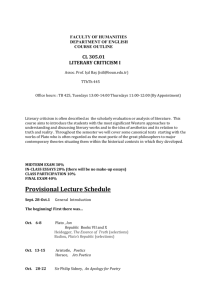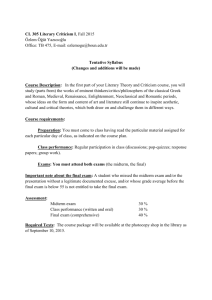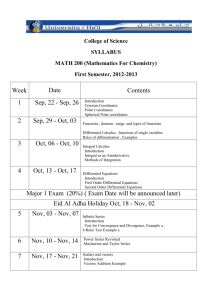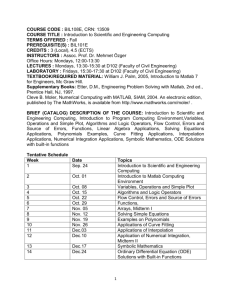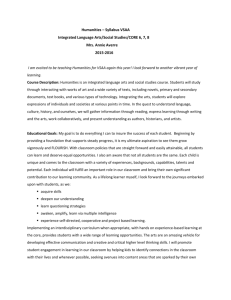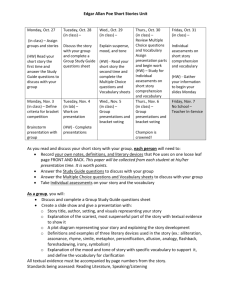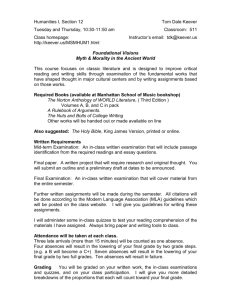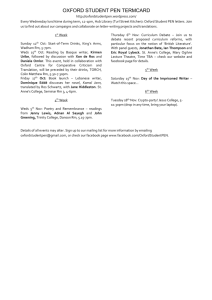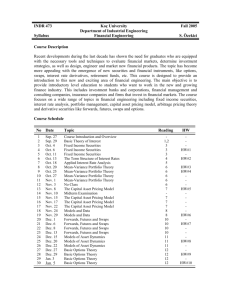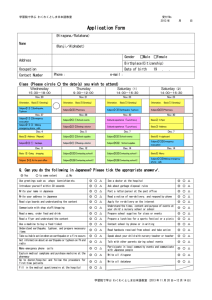HUMANITIES 131 syl and CEP online
advertisement
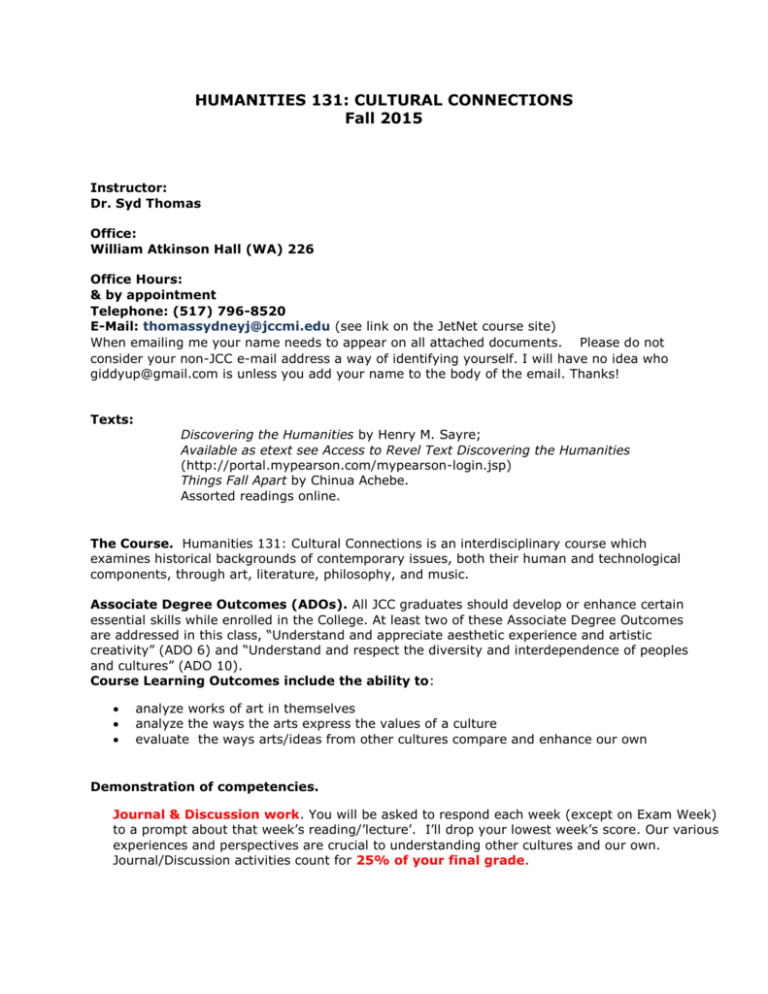
HUMANITIES 131: CULTURAL CONNECTIONS Fall 2015 Instructor: Dr. Syd Thomas Office: William Atkinson Hall (WA) 226 Office Hours: & by appointment Telephone: (517) 796-8520 E-Mail: thomassydneyj@jccmi.edu (see link on the JetNet course site) When emailing me your name needs to appear on all attached documents. Please do not consider your non-JCC e-mail address a way of identifying yourself. I will have no idea who giddyup@gmail.com is unless you add your name to the body of the email. Thanks! Texts: Discovering the Humanities by Henry M. Sayre; Available as etext see Access to Revel Text Discovering the Humanities (http://portal.mypearson.com/mypearson-login.jsp) Things Fall Apart by Chinua Achebe. Assorted readings online. The Course. Humanities 131: Cultural Connections is an interdisciplinary course which examines historical backgrounds of contemporary issues, both their human and technological components, through art, literature, philosophy, and music. Associate Degree Outcomes (ADOs). All JCC graduates should develop or enhance certain essential skills while enrolled in the College. At least two of these Associate Degree Outcomes are addressed in this class, “Understand and appreciate aesthetic experience and artistic creativity” (ADO 6) and “Understand and respect the diversity and interdependence of peoples and cultures” (ADO 10). Course Learning Outcomes include the ability to: analyze works of art in themselves analyze the ways the arts express the values of a culture evaluate the ways arts/ideas from other cultures compare and enhance our own Demonstration of competencies. Journal & Discussion work. You will be asked to respond each week (except on Exam Week) to a prompt about that week’s reading/’lecture’. I’ll drop your lowest week’s score. Our various experiences and perspectives are crucial to understanding other cultures and our own. Journal/Discussion activities count for 25% of your final grade. Exams and Quizzes. There will be a mid-term and final exam, each will be comprised of three parts: multiple choice, short answer and essay. There will also be 12 reading quizzes in Revel that will be worth from 5-20pts each. Again, I’ll drop your lowest week’s scores. Total of 60%. Cultural Events Project. You are required to attend one artistic cultural event — a concert, a theater production, a museum tour, a dance performance, a symphony concert -- of your choosing and on your own time. After you attend the event, I ask that you compose a formal paper 3-5 typed pages (about 800-1500 words) discussing prescribed aspects of the event. A separate document details specific instructions. There is another option for this assignment; more information on this is below and in JetNet. The project counts 15% of your grade. Late Work Policy: Assignments not submitted before the specified due date will receive no credit. Grading: I use a standard grading scale of 4.0 for excellent work, 3.0 for above average work, 2.5 for work just above average, 2.0 for average, and lower scores for below average. Academic Honesty Policy. Academic honesty is expected of all students. It is the ethical behavior that includes producing their own work and not representing others' work as their own, either by plagiarism, by cheating, or by helping others to do so. Please refer to the Student Rights and Responsibilities section of the student handbook for specifics. Tentative Course Calendar (Readings are in GREEN) DATES Course Content Sept. 21 Unit One Introduction to the class and The Middle Ages Readings: (Chapter Six) Sept. 28 Unit Two: The Early and High Italian Renaissance (Chapter Seven) Oct. 5 Unit Three: The Northern Renaissance (16 /17 )/Chinese Culture th (Chapter Eight) th Oct. 12 Unit Four: The Baroque Era (17 ) th (Chapter Ten) Oct. 19 Unit Five: The Enlightenment (18 ) th (Chapter Eleven) Oct. 26 Unit Six: Romanticism (19 ) th (Chapter Twelve) Nov. 2 Review and Mid-Term Exam on Nov. 5th Nov. 9 Unit Seven: West African/Chinese Culture (Chapter Three and Nine and Things Fall Apart) Nov. 16 Unit Eight: Realism thru Post-Impressionism (19 ) th (Chapter Thirteen) Nov. 23 Unit Nine: Modernism (20 ) THANKSGIVING RECESS th (Chapter Fourteen) Nov. 30 Unit Nine (Cont.) Modernism (20 ) Dec. 7 Unit Ten: Late Modernism and Post-Modernism (20th and 21st). th (Chapter FIFTEEN) Dec. 14 Unit Ten (Cont.) Post-Modernism (20th and 21st). Dec. 16 Last Day for Cultural Events Projects; Final Exam on Dec. 16 CULTURAL EVENT ASSIGNMENT (15% of Final Grade) As part of this humanities course, I would like you to attend an event, performance, museum, or presentation of your choice (acceptable to us) during the months of Sept., Oct., Nov., or Dec. —Please do not ask if you can use some event from your past even if it was on Sept. 19th!! You may select any of the events that I will be alerting you about or you may choose an artistic cultural event that interests and intrigues you. If you would like to attend an event that I haven't mentioned, you must receive my approval. You must make sure that you have evidence of having attended the event! Without evidence the paper will not be accepted. After you have attended the event, you will write a paper that will include: 1) A summary and description of the event, including the printed program if one is available—you must submit some evidence of attending the particular event. The summary should be no longer than a page. 2) Additional information about the work of art you viewed. If you attend a symphony or visit a museum, please select one particular piece of music or art work that grabbed your attention and find information about the artist’s work itself. If you attend a play, or dance concert, you might investigate the playwright's, director's or choreographer's artistic vision or point of view as represented by the play, film, or dance you viewed. Two sources are necessary for this research component—the program for the event does not count as research. Please list the research material you consulted in MLA style. If you are having difficulty finding research material see us; we will be glad to help. Special Note: Biographical information about the artist is not relevant here! Your focus should be on the work of art rather than on the artist's life. Think about how we've talked about paintings or poems or music in class. We've talked about the work itself and the history of its being made in a certain time and place rather than about the artist's personal life story. 3) A discussion of the work's connection to its culture. Show how the work reflects the cultural ideas and attitudes in which it was produced. Show the work's connection to its times. 4) Your response to the a) aesthetic qualities and your b) evaluation of the cultural event. Your typed paper should treat each of these areas. Missing discussion of any of these four areas will result in a lower grade. The paper should be between three to five pages in length. The summary should consist of no more than the first page. The other three areas should constitute the rest of your paper. Alternative Cultural Events Project For this alternative to the Cultural Events Project, you’ll design and execute your own work of art, specifically a “box art” creation. See examples posted on JetNet, and also you can discuss this project with me, as well. I won’t be giving much instruction on this assignment, so that you can be creative with your expression. This work of art will be graded like the Option One Cultural Events Project (attending an event)—meaning the amount of effort that is evident. You must build/create your art work with a message in mind. To complete this assignment fully you will need to create a box art with title, write a paragraph (of at least 350 words) about your art work that explains your intent, and then submit both the paragraph and (pictures of) the work of art. Both Cultural Events Projects can be ‘turned in’ at any time, but must be submitted no later than Dec. 16th.
